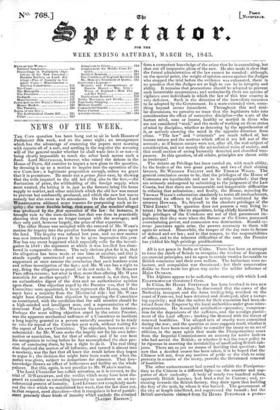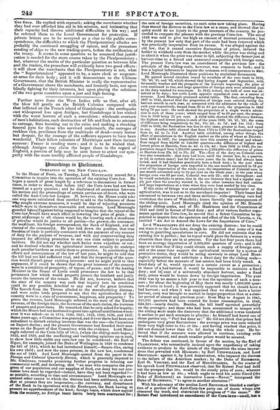All is not peace in India or China. There has
been an attempt to force the chiefs of Scinde to recognize the wisdom of European commercial principles, and to agree to certain treaties favourable to British commerce and their own welfare. The barbarians were re- luctant, and compulsion was threatened ; but their conservative dislike to freer trade has given way under the milder influence of
Major OUTRAM.
The Afghans appear to be suffering the anarchy with which Lord ELLENDOEOUGH threatened them.
In China, Sir HENRY POTTING ER has been involved in two new embarrassments. At Amoy, he discovered that the crews of the Nerbudda transport and the Anna trading-brig, wrecked on the coast of Formosa, had been detained and destroyed, after a tortur-
ing captivity ; and that the orders for their execution had been ob- tained from the Emperor by the local authorities under gross misre- presentations. He demanded satisfaction—pecuniary compensa- tion for the dependents of the sufferers, and the condign punish- ment of the local officers ; backing the demand with the threat of renewed hostilities. The alleged acts of cruelty were committed during the war ; and the question at once suggests itself, whether it would not have been most politic to consider the treaty as an act of oblivion in the same spirit that made the Plenipotentiary exact from the Imperial Commissioners an amnesty for native traitors who had served the British ; or whether it was the truer policy to
be rigorous in asserting the inviolability of unoffending British sub- jects. There are as yet no means of deciding that question ; but
now that a decided course has been taken, it is be hoped that the Chinese will not from any motives of pride or the wish to seize pretexts in evasion of the treaty, provoke the threatened renewal of hostilities.
The other embarrassment had served to exhibit the Plenipoten- tiary to the Chinese in a different light—as the asserter and sup- porter of their, authority. A body of nearly two hundred sailors,
apparently British Lascars' had bred a riot in Canton ; and, re- treating towards the British factory, they drew upon that building the fury of the mob, by whom it was burned. The government of the city at length interfered, and suppressed the tumult ; but the ritish raerchauts claimed fr9u1 5ir FUT:my Portman a protect- tire force. He replied with reproofs; asking the merchants whether they had ever afforded him aid in his mission, and intimating that their rapacity had thrown additional difficulties in his way ; and be referred them to the Local Government for protection. If private letters are to be accepted as a clue to the public corre- spondence, the difficulties to which the Plenipotentiary alludes are probably the continued smuggling of opium, and the premature sending of ships to the new trading-ports, before the ratification of the treaty. It seems in some quarters to be assumed that justifi- cation is needed for the stern course taken by the Plenipotentiary ; but, whatever the merits of the particular question as between him and the traders, the procedure will evidently have two good effects : it will show the merchants that the Plenipotentiary as not, what the "Superintendent" appeared to be, a mere clerk or sergeant- at-arms for their body ; and it will demonstrate to the Chinese Government, that the British Minister is really the representative of a Government above the merchants, and honestly bent, not upon blindly fighting for their interests, but upon placing the relations
of two great countries upon a just and high footing.



























